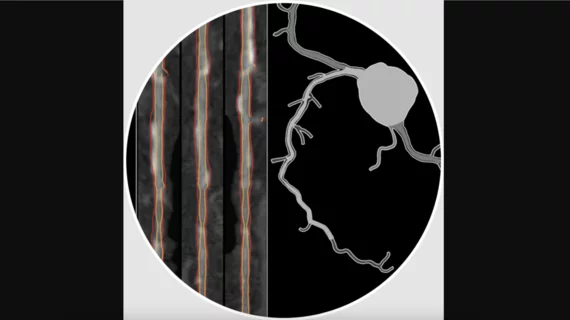AI-powered coronary plaque assessments show ‘strong agreement’ with IVUS
Using artificial intelligence (AI) to evaluate medical imaging results and quantify coronary plaque may deliver results comparable to more invasive techniques, according to new data published in the European Heart Journal – Cardiovascular Imaging.[1]
The study’s authors compared the noninvasive Plaque Analysis technology developed by HeartFlow, which uses advanced AI algorithms to evaluate coronary CT angiography (CCTA) images, with coronary plaque assessments achieved by using intravascular ultrasound (IVUS). The REVEALPLAQUE trial included data from 237 patients who presented at one of 15 centers in the United States or Japan. Patients were evaluated using both Plaque Analysis and IVUS; the specialists performing IVUS were blinded to all Plaque Analysis results, and the specialists using Plaque Analysis were blinded to all IVUS results.
Overall, researchers found that Plaque Analysis “showed strong correlation and high accuracy when compared with IVUS.” When assessing total plaque volume, for example, the AI-powered technique agreed with IVUS 95% of the time. It also agreed with IVUS 95% of the time when assessing calcified plaque volume, and 93% of the time when assessing non-calcified plaque volume.
“AI-enabled CCTA quantification and characterization of atherosclerosis demonstrated strong agreement with IVUS reference standard measurements,” wrote Jagat Narula, MD, PhD, co-principal investigator and chair of coronary pathophysiology with the McGovern Medical School at UTHealth Houston, and colleagues. “This tool may prove effective for accurate evaluation of coronary atherosclerotic burden and cardiovascular risk assessment.”
HeartFlow comments on positive data
HeartFlow, which sponsored REVEALPLAQUE, issued a statement highlighting the results.
“With the addition of the REVEALPLAQUE data, we’re pleased to highlight that we are the only platform that has conducted and published a head to head comparison vs. IVUS using the most rigorous approach possible,” Campbell Rogers, MD, HeartFlow’s chief medical officer, said. “Our plaque assessment technology is highly accurate, giving clinicians confidence in the product to support their clinical decision making.”
Click here to read the full study in European Heart Journal – Cardiovascular Imaging, a publication from the European Association of Cardiovascular Imaging and European Society of Cardiology.

